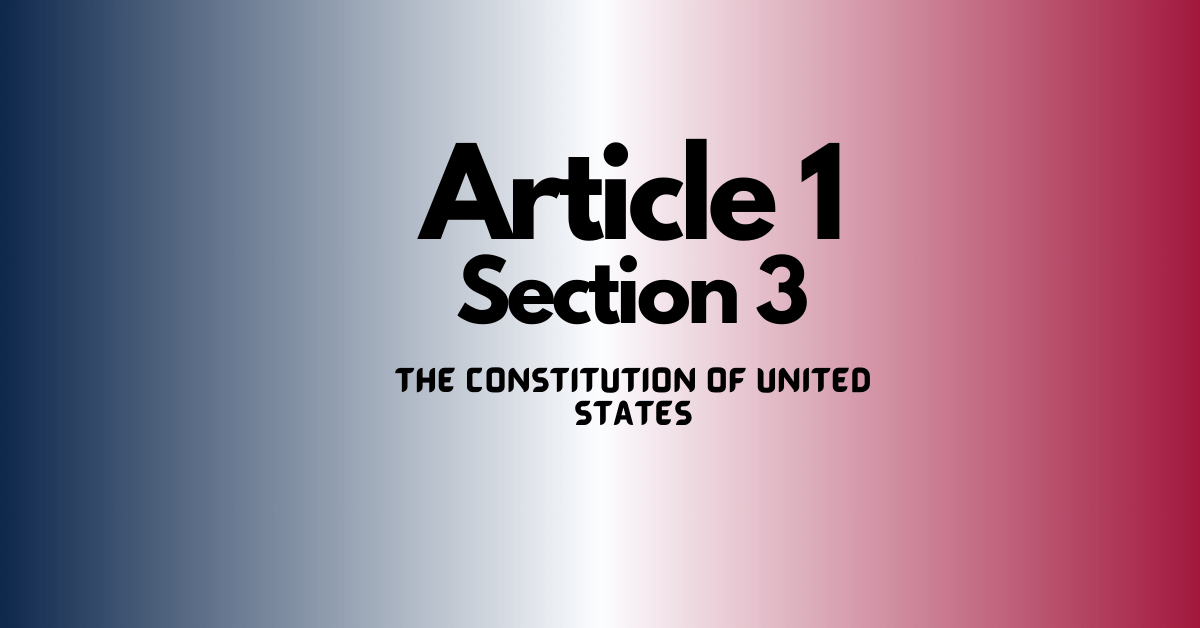Article 1 , Section 3 (Original text):
The Senate of the United States shall be composed of two Senators from each State, [chosen by the Legislature thereof,] for six Years; and each Senator shall have one Vote.
Immediately after they shall be assembled in Consequence of the first Election, they shall be divided as equally as may be into three Classes. The Seats of the Senators of the first Class shall be vacated at the Expiration of the second Year, of the second Class at the Expiration of the fourth Year, and of the third Class at the Expiration of the sixth Year, so that one third may be chosen every second Year; [and if Vacancies happen by Resignation, or otherwise, during the Recess of the Legislature of any State, the Executive thereof may make temporary Appointments until the next Meeting of the Legislature, which shall then fill such Vacancies.]
No Person shall be a Senator who shall not have attained to the Age of thirty Years, and been nine Years a Citizen of the United States, and who shall not, when elected, be an Inhabitant of that State for which he shall be chosen
The Vice President of the United States shall be President of the Senate, but shall have no Vote, unless they be equally divided.
The Senate shall chuse their other Officers, and also a President pro tempore, in the Absence of the Vice President, or when he shall exercise the Office of President of the United States .
The Senate shall have the sole Power to try all Impeachments. When sitting for that Purpose, they shall be on Oath or Affirmation. When the President of the United States is tried, the Chief Justice shall preside: And no Person shall be convicted without the Concurrence of two thirds of the Members present.
Judgment in Cases of Impeachment shall not extend further than to removal from Office, and disqualification to hold and enjoy any Office of honor, Trust or Profit under the United States: but the Party convicted shall nevertheless be liable and subject to Indictment, Trial, Judgment and Punishment, according to Law.
Explanation:
This section of the Constitution outlines the composition, terms, qualifications, roles, and powers of the Senate, including its role in impeachment proceedings.
Composition of the Senate
- The Senate of the United States is composed of two Senators from each state.
- Senators serve for six years, and each Senator has one vote.
Classification and Terms
- Senators are divided into three classes as equally as possible immediately after the first election.
- The seats of Senators in each class are vacated at staggered intervals:
- The first class’s seats expire at the end of the second year.
- The second class’s seats expire at the end of the fourth year.
- The third class’s seats expire at the end of the sixth year.
- This setup ensures that approximately one-third of the Senate is up for election every two years.
Qualifications for Senators
- To be eligible to serve as a Senator, a person must:
- Be at least thirty years old.
- Have been a citizen of the United States for at least nine years.
- Be an inhabitant of the state for which they are chosen at the time of their election.
Vice President’s Role
- The Vice President of the United States serves as the President of the Senate.
- The Vice President only votes in the Senate if there is a tie.
Senate Officers
- The Senate chooses its other officers and a President pro tempore.
- The President pro tempore serves in the absence of the Vice President or when the Vice President exercises the role of President of the United States.
Powers of the Senate
- The Senate has the sole power to try all impeachments.
- When sitting for an impeachment trial, Senators must take an oath or affirmation.
- If the President of the United States is being tried, the Chief Justice presides over the trial.
- Conviction in impeachment trials requires the concurrence of two-thirds of the members present.
- The judgment in cases of impeachment can only extend to removal from office and disqualification from holding any future office of honor, trust, or profit under the United States. However, the convicted party is still liable to face indictment, trial, judgment, and punishment according to law.
FEEL FREE TO ASK DOUBTS IN THE COMMENTS
